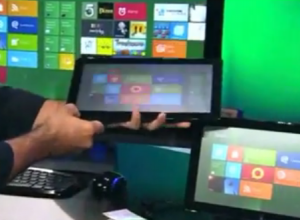Microsoft to Support NFC in New Operating System; NXP and ST Offer Chips

Microsoft has made known its support for NFC, with a demonstration of the technology in a prototype tablet at its Build developers' conference Tuesday in California.
The software giant was previewing its Windows 8 operating system for PCs and tablets at the event and showed “tap-to-share” applications by tapping a tablet to a contactless card and to another tablet. Windows 8 is a follow-up to Microsoft’s present Windows 7 operating system for PCs.
Update: Netherlands-based NXP Semiconductors seized on the Windows 8 preview event to announce the same day that the prototype tablets demoed at the conference carry its PN544 NFC chips. Chip maker STMicroelectronics followed a day later with an announcement of its own, saying it has been working with Microsoft to offer its NFC chip, the ST21NFCA, for Windows 8 tablets and PCs. There was no word on whether any ST chip was being used in a prototype device at the Build conference.
The NFC chips in the tablets from NXP support the SIM card as a secure element, but it's not clear if the implementation in the prototype tablets, reportedly made by Samsung, support secure applications. ST said secure elements are optional with its NFC offer for Windows 8. Both the NXP and ST NFC chips could support tag reading and peer-to-peer communication along with card emulation–although they would likely need a secure element for the later mode of operation. End update.
But NXP noted in its announcement that the NFC chips in Windows 8 tablets could be used, for example, to share content or pair devices, such as tapping a tablet to a headset or speaker to automatically open a Bluetooth connection between the two devices.
Users also could tap two tablets together to transfer of a video call from one tablet to another, said the chip maker. And there could be such well-known tag-reading applications as downloading coupons by tapping tablets to NFC tags in smart posters or checking in at restaurants, bars or other establishments by tapping tags linked to social-networking sites.
“NFC support for Windows 8 is a significant step in the rollout of this game-changing technology and truly signifies that the time of NFC is now,” Ruediger Stroh, executive vice president and general manager for NXP’s identification unit, said in a statement.
Update: ST's Marie-France Florentin, general manager of the secure microcontrollers division, said in a statement that with an ST's NFC chip in a Windows 8 device, “end users will enjoy new and convenient ways of interacting and sharing data with their peers.” As with the NXP chip, Windows 8 tablet and PC makers would choose whether to incorporate the ST NFC chip in their devices. Switzerland-based ST has yet to announce an actual design win for its NFC chip from a phone or other device maker. End update.
Microsoft hopes the new operating system, likely to be released next year, will help it take on Apple's iPad and other tablet computers. NFC could be incorporated in desktop PCs running Windows 8, as well, to share content and pair with other devices, among other applications.
Microsoft during the presentation Tuesday did not say when its separate smartphone operating system, Windows Phone, would support NFC. But NFC Times has learned the first NFC-enabled Windows phone devices made by Nokia will hit the market in 2012. Those phones likely will support a secure element and wallet developed by Microsoft, sources have told NFC Times. It's possible a Windows Phone handset supporting NFC could be released by another phone maker before the end of this year.
NXP is also expected to supply NFC chips for the first Windows phones. The chip maker already supplies NFC chips to Nokia for smartphones supporting the latter’s Symbian operating system.
Although a sponsor member of the NFC Forum standards and trade group, Microsoft has made few public statements of support for NFC, though its work with the technology is no secret.












